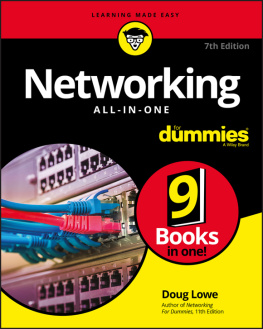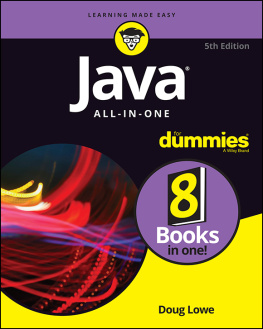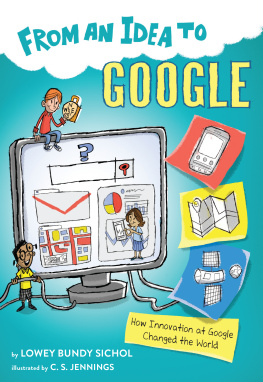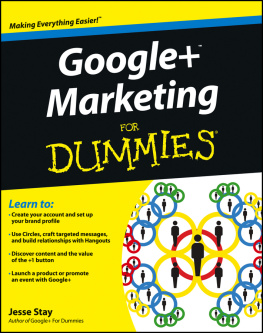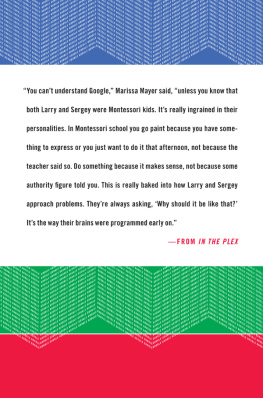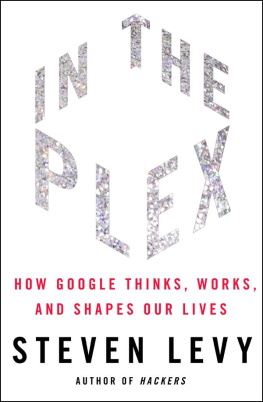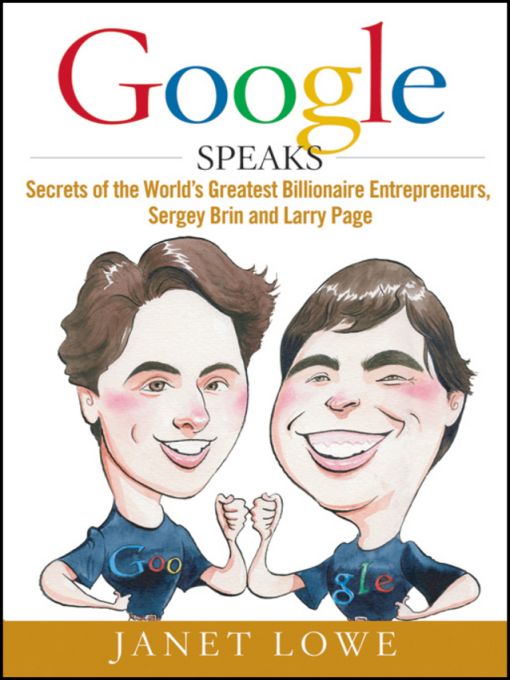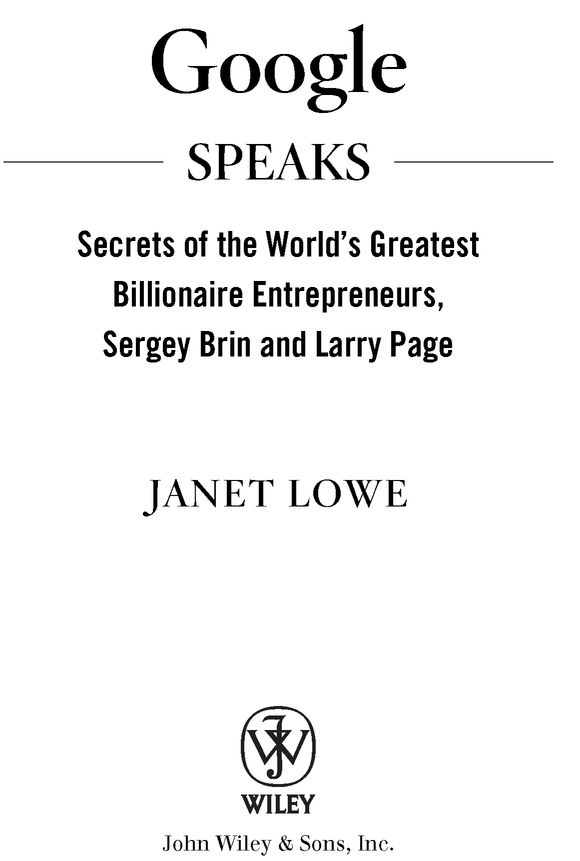Table of Contents
Dedicated to Stephen Plaxe, Carolyn Muller,
Audrey Sniegowski, Dale and Kathy Lowe,
Jade Easton, and all my other Angels.
Thank you.
Acknowledgments
Thank you to the following people for the enormous credit they deserve for this book: Joan ONeil, Kevin Commins, Emilie Herman, and Mary Daniello at John Wiley & Sons, the staff at Cape Cod Compositors, my literary representative Alice Martell, copy and content editor Lynne Carrier, and advisors and helpers Alan Bradford, Jack Brandais, Warren Buffett, Ben and Carol DeBolt, Trudy Jenzer, John McDermott, and Professor Joel West.
Introduction
At the tenth birthday of Google Inc., founders Larry Page and Sergey Brin stood on the grounds of Vandenberg Air Force Base in central California. They watched in wonder as a state-of-the-art Delta 2 rocket blasted into the atmosphere, carrying a GeoEye-1 satellite into orbit. The satellite, adorned with the Google logo, would send back razor-sharp photos to be used in the companys popular mapping service. What a glorious way to celebrate the first decade of a company that itself took off like a rocket from its very beginning.
Chris Winfield, who heads the search-engine ad firm 10e20, noted that in a very short time, Google has become a rage, the equivalent of the Beatles during the 1960s. Its pretty amazing, its almost like they are in control of the world.
The story of the search-engine company Google and its two young founders is loaded with superlatives, secrets, and surprises. One thing is certain: The Google guys, Larry and Sergey, both now 36, have become the undisputed lords of all information.
In 2006, Time magazine called Google the smartest company of the year and one of the centurys most game-changing enterprises. Google was crowned the worlds largest search engine and one of the best-known global brands. Praise like that could well go to a company leaders head.
The Google founders have been described in many ways, including the Thomas Edisons of the Internet. Brin and Page are the twin Princes of High Technology who pulled the proverbial sword from the stone. They were groomed for greatness in the computer field from infancy; they traveled to a holy land (Stanford University and Silicon Valley) to prove their mettle in battle. They slew a whole den of dragons and emerged from the quest with flags of victory flying. Their story is a classic heros journey.
Larry and Sergey were accustomed to the role of high achievers. Both are sons of scientists, and both grew up in technology-oriented households. Both were bright and accomplished in school. At Stanford and in Silicon Valley, they were surrounded by a court who knew the landscape of that charmed kingdom. Their professors were among the best in the field of computer science. His brother had already set up a company by the time Larry enrolled at Stanford University, and the brother later sold it to Yahoo!. Sergeys father-in-law is a Stanford physics professor. His sister-in-law was a Silicon Valley venture capitalist.
Clearly, both men were exceptionally smart and had entrepreneurial personalitiesand it was as if they quickly recognized the potential mirrored in one another. They followed their destiny when they developed Google search software. And the community around them, ever alert to the next big idea from techies just barely of legal age, was just waiting for them to step up.
To say Sergey and Larry were trained from birth for what they became does not diminish the vast importance or meaning of what they have done. In the 12 years since they first began collaborating on a graduate school project, the Google guys have:
Started a business in a college dorm room with no more assets than a great idea.
Built the largest index of Web pages in the world.
Google catalogued its trillionth Web page in the summer of 2008.
Launched with $100,000 private capital and developed into a public corporation with a market capitalization of around $100 million.
Expanded from just the two of them to more than 20,000 employees.
Grown their company into a giant with a 1.5-million-square-foot headquarters in Mountain View, California, plus two dozen other U.S. offices and technical centers in more than 30 countries.
Gathered a customer base, starting with those using a college website and becoming one of the most global corporations in existence.
Spread from a single service to a Web portal with dozens of services and products
Dominated the Internet search industry, handling more than 70 percent of all U.S. searches.
Developed advertising revenues of around $16 billion a year. This is nearly as much advertising revenue as generated by the four major TV networks combined.
Sergey and Larry were ranked as numbers 32 and 33 on Forbes 2008 list of billionaires, with each of them worth more than $18 billion at the time. They subsequently lost about $6 billion in the value of their Google stock, but they remained fabulously rich.
With their fortune came fame. Not so many years after Google debuted, Larry and Sergey visited an Israeli high school for gifted math students. When the pair walked on the stage in the auditorium, they were greeted with a roar usually reserved for rock stars. Every student there, many of them immigrants like Sergey from the former Soviet Union, knew of Google. And like budding scientists everywhere, many of the students hoped to achieve the same success and status.
Despite a distinct nerdiness, their regal demeanors have shown forth in the way they initially marketed their company, as they dealt with venture capitalists, in the way they chose a chief executive officer, in the path by which they took Google public, and later, when dealing with contentious issues such as corporate secrecy, privacy, the intellectual property of others, corporate governance, and new product development. They invariably acted independently and with self-assurance, if not with a good dose of divine right.
There has never been a company, wrote author Ken Auletta, whose influence extended so far over the media landscape, and which had the ability to disrupt so many existing business models.
To survive the economic downturn, Google has hunkered down, prioritizing investments in display advertising, online business software, and mobile telephone ads. Nevertheless, the company remains robust.
Page and Brin have become about as powerful as it is possible to be in the high-tech industry. And they have been able to spin that power up to a global level. In Great Britain, the newspaper The Guardian publishes the MediaGuardian 100 list, ranking the most powerful individuals in media. The roll embraces every sector, including print news, broadcasting, publishing, advertising, and digital media. Larry and Sergey took the top slot. Microsofts Steve Ballmer was seventh on the list. Yahoos Jerry Yang, who just months before was a Silicon Valley celebrity entrepreneur, was not to be found
In order to expand their audience, potential targets for advertising, Google has come up with an astounding array of products. These include an online classified advertising site, a project to scan every book ever published and put excerpts on line, e-mail, instant messaging service, mobile phone software, and so on. Google also sells content, for example, via an online video store selling TV shows and National Basketball Association games.





